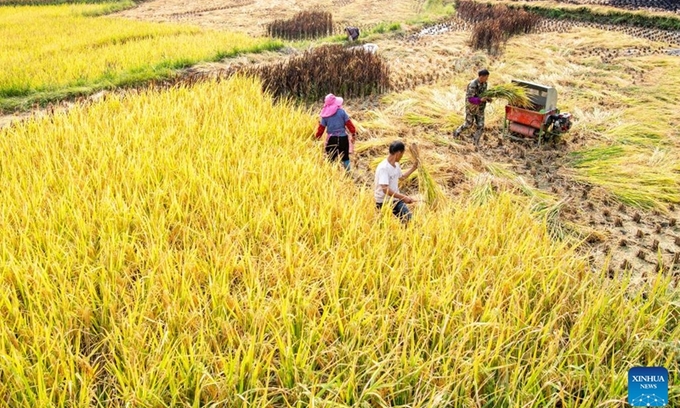May 24, 2025 | 16:23 GMT +7
May 24, 2025 | 16:23 GMT +7
Hotline: 0913.378.918
May 24, 2025 | 16:23 GMT +7
Hotline: 0913.378.918

Farmers harvest rice at the paddy fields in Huatian Town of Youyang Tujia and Miao Autonomous County, southwest China's Chongqing, Sept. 14, 2022. Huatian Town of Youyang Tujia and Miao Autonomous County in Chongqing is famous for its rice production on terraced fields. Photo: Xinhua
The rise in rice imports, which are expected to be mainly used as feed grain, mainly reflected low global prices and does not reflect changes in domestic output due to drought, experts noted.
China's General Administration of Customs (GAC) said that from January to August, total rice imports reached 4.56 million tons, up 42.5 percent year-on-year.
"China increased rice imports because global supplies were plentiful and prices were low compared with other grain crops such as wheat," Li Guoxiang, a research fellow at the Chinese Academy of Social Sciences, told the Global Times on Sunday.
According to the GAC, the average price of China's rice imports in July reached $400.86 per ton, down 11.76 percent year-on-year.
In August, China imported 480,000 tons of rice, an increase of 34.8 percent year-on-year; while in July, imports rose 73.7 percent year-on-year to more than 499, 000 tons, customs data showed.
A new survey by the Ministry of Agriculture and Rural Affairs showed that more than 170 million mu (11.3 million hectares) of the nation's autumn grain crops have harvested, or 13.3 percent.
"The rise in rice imports had nothing to do with natural disasters like drought this year, as China was already increasing imports of the grain from January this year," Jiao Shanwei, editor-in-chief of industry news website cngrain.com, told the Global Times on Sunday, noting that the drought in the south this summer had limited impact on China's autumn harvest this year.
Li noted that the main production area of rice in China is in the northeast, which had sufficient rainfall this year, while the south experienced drought, so China's output doesn't reflect the impact of the natural disaster.
"The bulk of imported crops are expected to be used as feed grain. It's a sector where the country has seen expanding demand in recent years," Jiao said.
Ye Xingqing, a senior expert at the rural economy center of the Development Research Center of the State Council, made the remarks at an international forum discussing the development and investment of grain supply chains during the 2022 China International Fair for Trade in Services.Over the past decade, China's grain production has been climbing while grain imports have also been increasing. In 2021, the country produced 680 million tons of grain, an increase of 70 million tons from 10 years ago. Meanwhile, its grain imports also reached 164.54 million tons last year, including 90 million tons of soybeans, according to media reports.Ye noted that moderate imports are important to ensure China's food security due to the increasing volatility of global food prices as well as some countries' restrictions on food exports. "Some foreign media outlets may make something out of China's grain imports, alleging that the country's grain stocks have pushed up international food prices," Ye said, noting that China's imports do not steal others' rice bowls.
(Global Times)

(VAN) Alt Carbon has raised $12 million in a seed round as it plans to scale its carbon dioxide removal work in the South Asian nation.

(VAN) Attempts to bring down the price of the Japanese staple have had little effect amid a cost-of-living crisis.

(VAN) Fourth most important food crop in peril as Latin America and Caribbean suffer from slow-onset climate disaster.

(VAN) Shifting market dynamics and the noise around new legislation has propelled Trouw Nutrition’s research around early life nutrition in poultry. Today, it continues to be a key area of research.

(VAN) India is concerned about its food security and the livelihoods of its farmers if more US food imports are allowed.

(VAN) FAO's Director-General emphasises the need to work together to transform agrifood systems.

(VAN) Europe is facing its worst outbreak of foot-and-mouth since the start of the century.